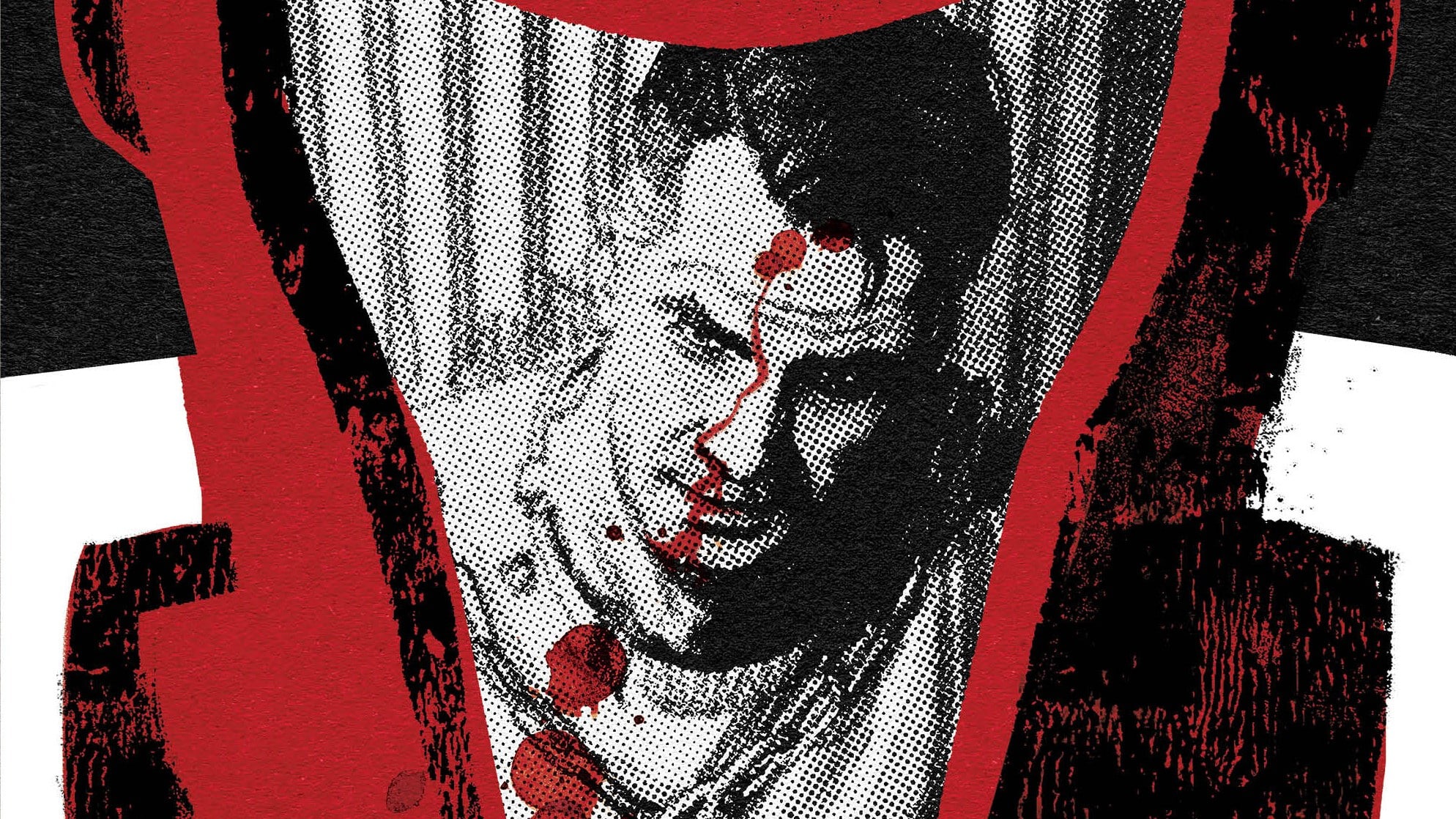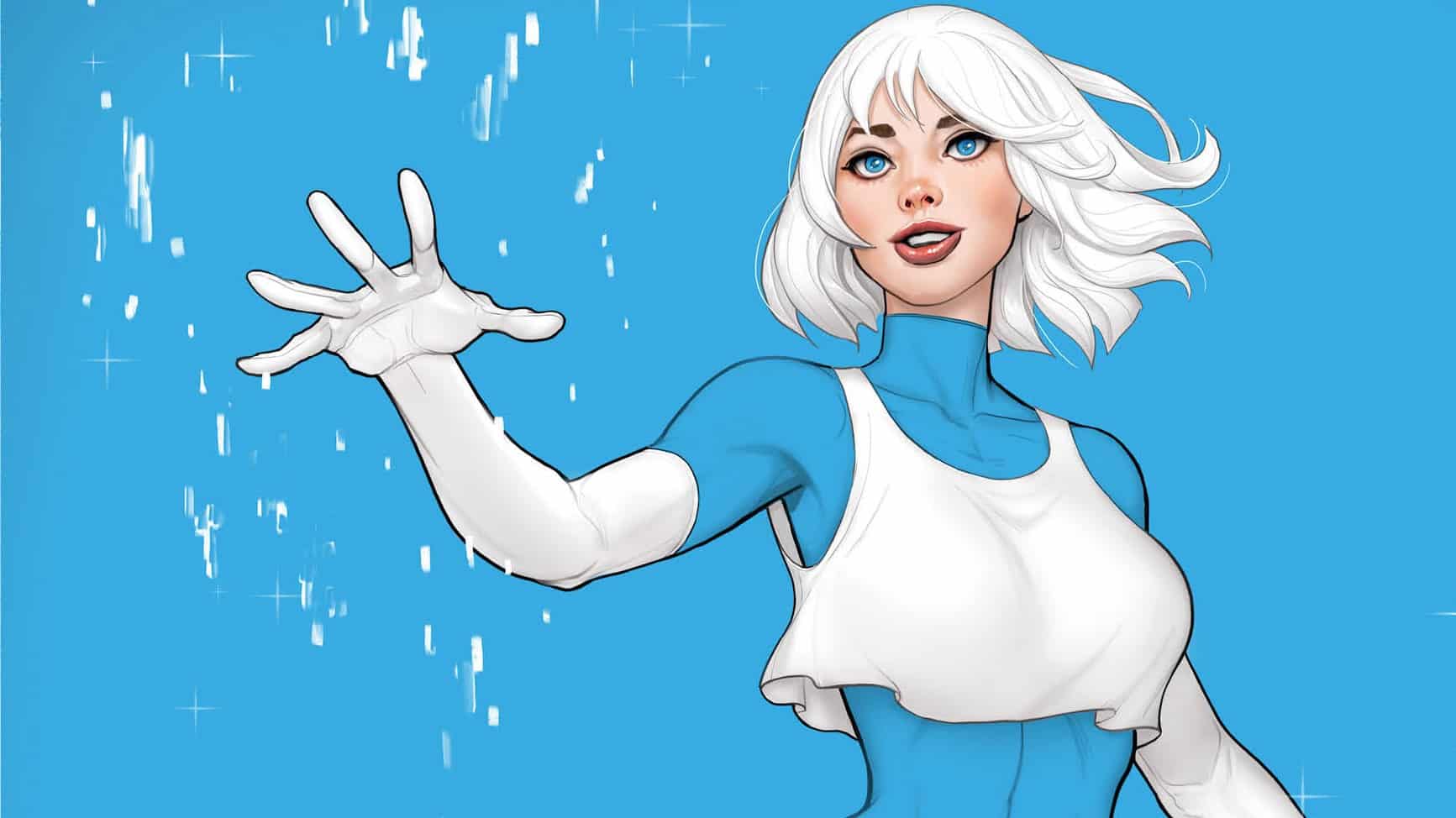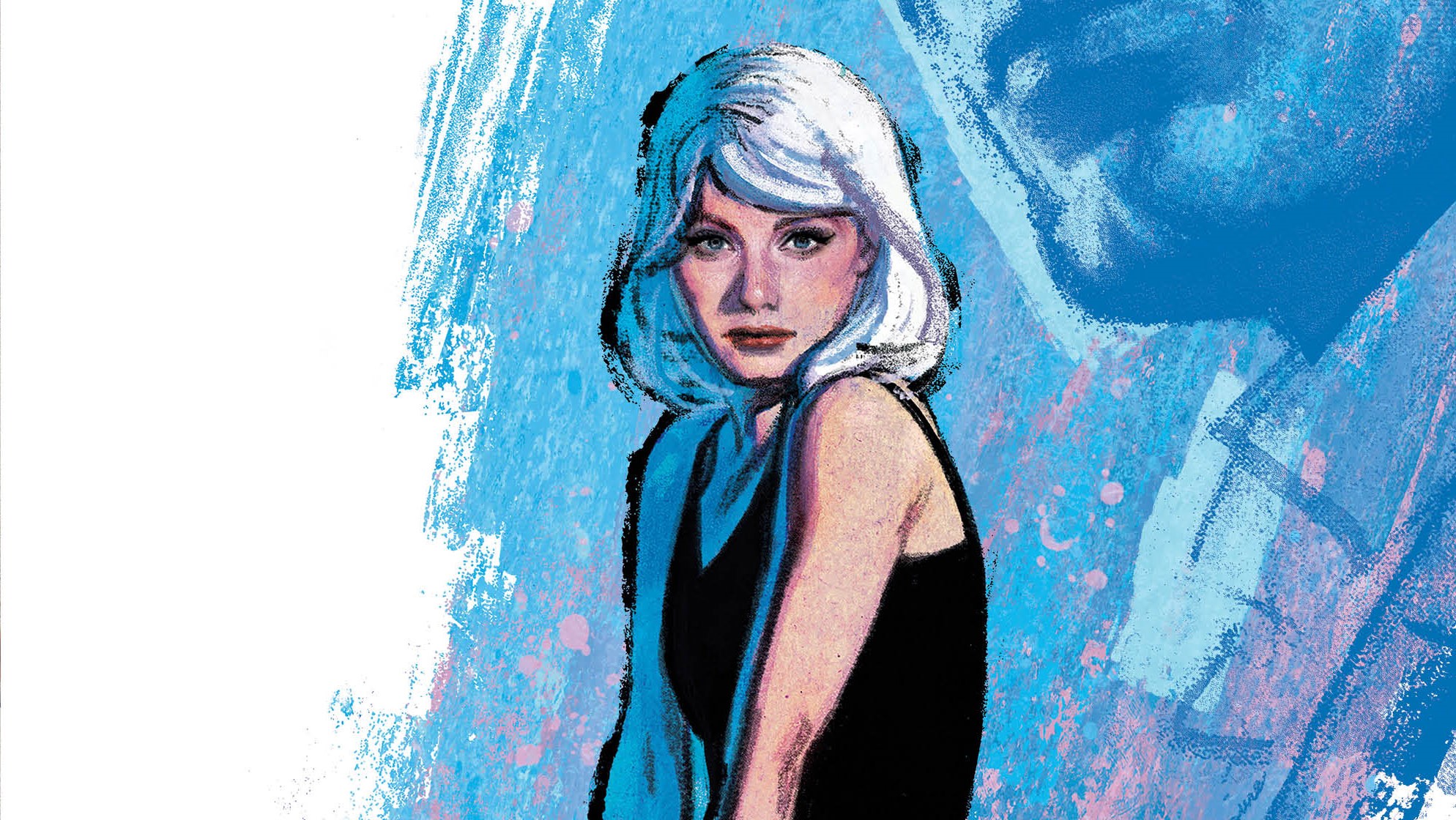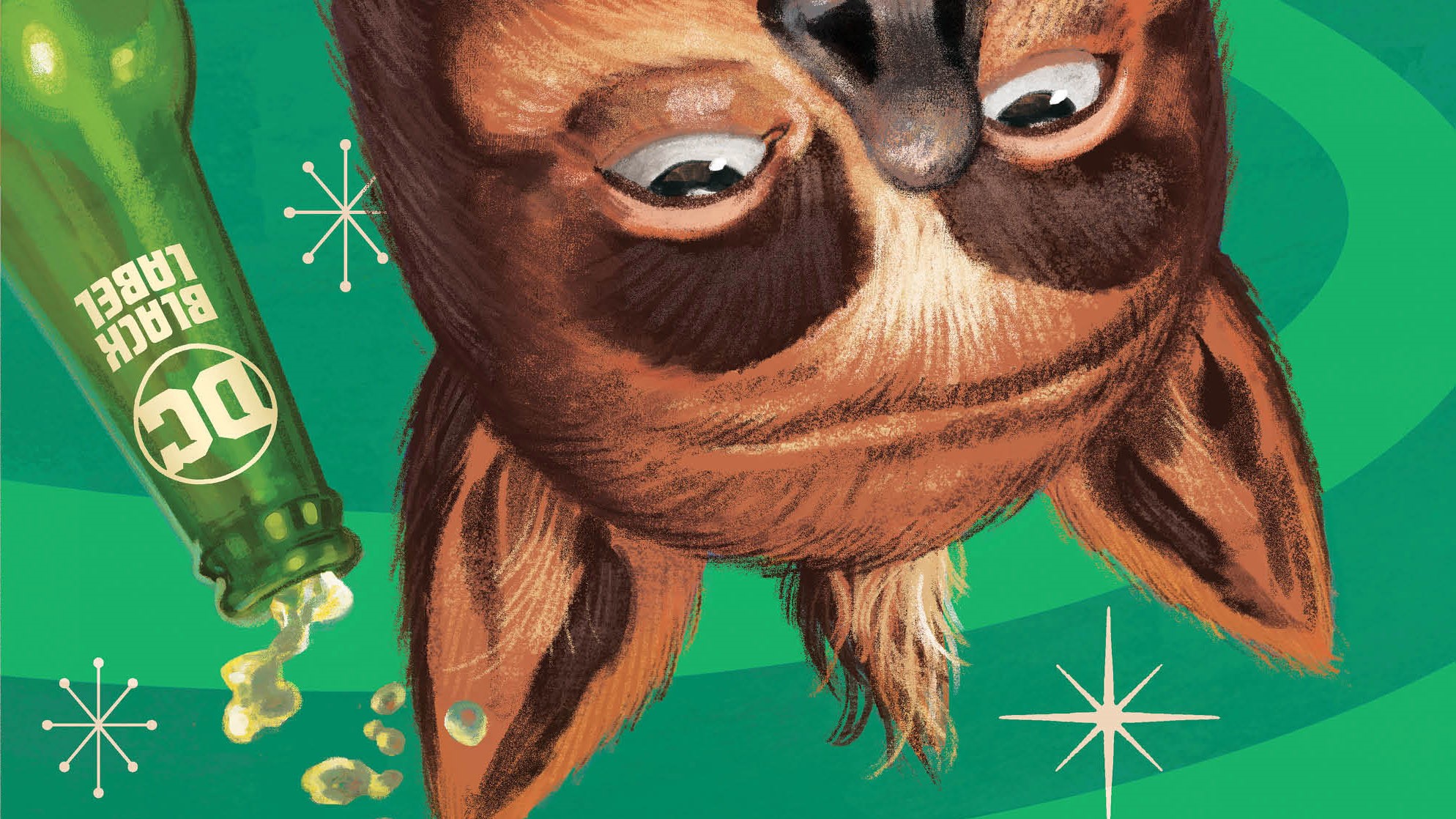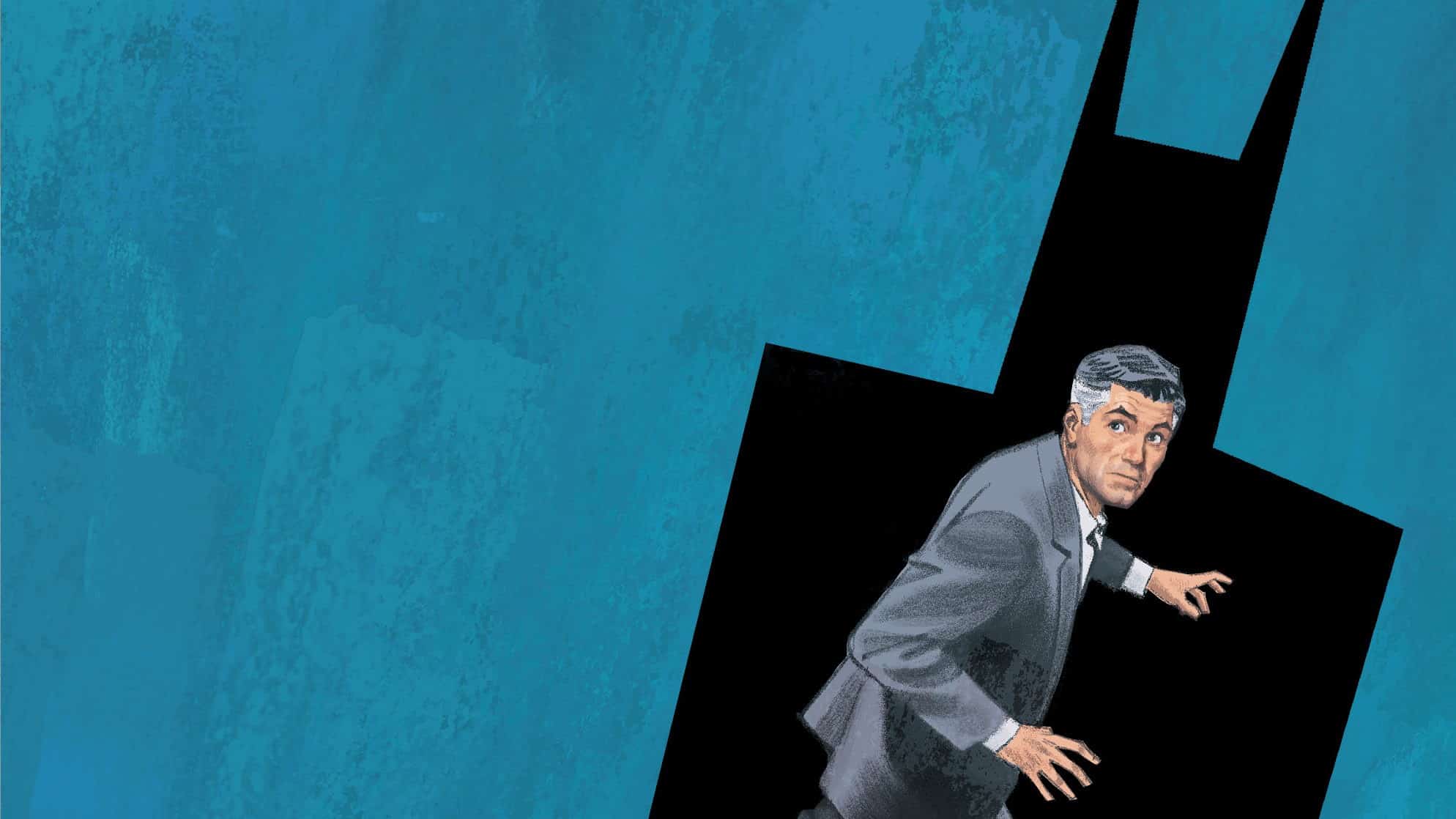Time is running out for Christopher Chance to find his murderer, but his investigation into the Justice League International takes a violent turn when Rocket Red comes knocking, looking for his friend Guy Gardner. Find out what time it is in The Human Target #8, written by Tom King, drawn by Greg Smallwood and lettered by Clayton Cowles for DC’s Black Label.
Armaan Babu: Dan, did you really promise our readers they’d find out what time it is in a review asynchronously written by people in two very different time zones?
Dan Grote: I mean, listen, time is a flat circle. Time isn’t holding up; time isn’t after us. Time I don’t understand; children killing in the street, dying for the color of a rag. Time, time, time, see what’s become of me, while I look around for my possibilities. Et cetera!
(If there’s a song with time in the lyrics written after 1994, I haven’t heard it.)
Armaan: Well, I’ll tell you what time it is. It’s hammer time. Also sickle time. Tom King wants you to know that Rocket Red is Russian, and he’s as subtle about it as an armored slap to the face. Let’s dive in!
Did We Like This Comic?

Armaan: We both agreed that last issue was the weakest of the lot so far, and I think we both agree that this issue was definitely a step up. However, overall, I’m still a little unsatisfied. What drew me into this was that it was an old-school noir, hard-boiled detective mystery comic. That mystery seems to have been abandoned (There’s a panel here that says as much), and this series has just become about King’s take on JLI characters which … is not a great hook. Especially since some of them are so far removed from their original characterizations that they might as well just be new characters.
Dan: I agree. We both were wondering when someone was going to come snooping around inquiring about the death of Guy Gardner. And we both hoped it would be someone different. Someone a little more … nocturnal and … Bat-themed. Just because the JLI had enough members to write a 12-issue series about each one of them doesn’t mean each one deserves a whole issue. I mean, look, I appreciate G’nort as much as the next casual DC fan, but do I really want issue #9 to be 22 pages of deep introspection about what it means to be a dog-faced space cop and how far he’ll go to protect the thin Green line when one of his comrades falls? Hmm … actually, there’s a lot of good story potential there.
Armaan: Actually, yeah, you’re starting to turn me around on —
Dan: Let me rephrase: Do I really want Tom King to write 22 pages of deep introspection about what it means to be a dog-faced space cop and how far he’ll go to protect the thin Green line when one of his comrades falls? No. No I do not.
Armaan: Dammit. You’re right. Neither of us wants that. But I’m pretty sure that’s what we’re getting anyway.
Russia Stuff

Dan: As the DC luddite of the two of us, I have to ask, what do you know about Rocket Red, Armaan?
Armaan: Not a lot.
The thing about a series whose main hook is reading King’s take on its main characters is that the JLI hit that perfect sweet spot — known enough to be instantly familiar, but also obscure enough overall for King to reinvent some of them wildly without readers being able to really tell the difference. I admit to not knowing a lot about Rocket Red going into this series — the few appearances I’ve seen him in, he’s always been presented as a jolly guy making affable, goofy Russian references and having technology that’s juuuust underdeveloped enough that you’re not thinking of Iron Man in every fight sequence Rocket’s in. [Editor Matt’s Note: As someone who read the entire JLI run … yup, that’s about it.] What about you, Dan?
Dan: This was my introduction to the character, and I have to be honest, I was expecting a lot different.
If you recall the original JLI group shot in Human Target #1, Rocket Red has a goofy smile on his face, and it looks like he’s missing a tooth, less a Russian scientist turned superhero than Russian hockey player turned superhero. I assumed he might be a joke character, something more akin to 1980s comedian Yakov Smirnoff, whose whole shtick was making jokes about how terrible Soviet Union is. That and guest starring on Night Court.
He’s clearly a relic of 1980s portrayals of Russians in popular media, specifically the late 1980s glasnost era when U.S. and Russian relations were cooling under Mikhail Gorbachev. Less Red Dawn and more that episode of Head of the Class where the class went to Russia.
Now, Russia has reclaimed its role as the world’s bogeyman, committing atrocities in Ukraine and threatening nuclear war if the West goes too far in defending this grain-producing bulwark between East and West. The Russians are the bad guys again after 20 or so years of forever wars in the Middle East, and while that may not have been the case when King was scripting this series, it certainly colors our read of the book in fall 2022.
Armaan, you’re from a different part of the world; does India view Russia with the same sort of G.I. Joe vs. Cobra mentality as the U.S.?
Armaan: Not exactly. Politically, they’ve been seen as tentative allies a lot more than the U.S. has traditionally seen them. Pop culture-wise, the general attitude about Russia is that it’s a country filled with people who achieve almost comedic levels of badassery, a characterization this issue’s Rocket Red certainly fits with.
We’ve seen hints of it, but the obsession with machismo is getting exhausting at this point. It’s one thing when we have Guy and Chance fighting over Ice in previous issues, because the whole point of Guy is that he’s a toxic asshole. But it’s being hammered in. Chance threatening to kill for tranquilizing Ice. Both men just throwing insults at each other to one-up their badassery. It’s exhausting.
Dan: Just like real U.S.-Russian politics!
Tom King and His Goddamn Formalism

Dan: As we mentioned in the intro, time is a big theme in this issue. Christopher Chance doesn’t have much of it left, and over the course of the issue, as Rocket Red keeps knocking him out, Chance repeatedly asks what time it is — “like, the hour and the minute” — as he comes to.
He does this both because Rocket Red is costing him a day interrogating him about Guy but also because Ice is supposed to call her Russian ally disguised as Guy at a certain time, which would give Chance his alibi.
But he also does it because Thomas King cannot help himself when it comes to repetition. He can’t do it. He can not do it. Can’t be done. Nope. Nuh-uh. He’s gotta repeat himself. Gotta repeat those THEEEEEEEEEMES.
And frankly we’re at the part of the Family Guy bit where it’s gone back to being annoying.
Armaan: I get that you were parodying King’s repetitiveness there, but you honestly gave us a lot more variety than we’re used to getting from King when he starts to fixate on something. It’s tiring, yes, but when you combine it with the sense that the book is spinning its wheels until the next actual big reveal, it starts to feel like King is just padding out the book.
However, it is something that Smallwood’s art plays especially well with. It doesn’t capture the fluidity of movement on the page in the way some of my favorite artists do. He goes right to the heart of comics — still moments captured, movement implied. The impact of the moment matters more than the motion of it. King’s writing doesn’t flow, either — it’s a collection of moments scattered about an issue, scattered throughout a series. We get cool moments — but I don’t know how much of a good story we’re getting.
Especially the more the repetitiveness starts to creep in.
Dan: It’s why when we get to the double page spread of Chance floating in the air over the Earth — this seemingly serene moment of actual terror — it’s such a breath of fresh air.
King demands formalism, can’t write without it, so it’s nice when things slow down and you can just appreciate the large image of Chance falling to his death and don’t have to think about who wrote the scene.
There are plenty of the three-, six- and nine-panel grids King’s work demands — because of the repetition, you see — but it’s so nice when Smallwood bucks that. Another page of Chance falling, one vertical panel with text running alongside it, is another highlight. Here, King can get as purple as he wants, but it doesn’t — it can’t — interfere with the art. The eye is drawn to the helpless speck that is Christopher Chance in his flapping jim-jams. And yeah, there are some words there, too.
It’s funny, a few years ago I was participating in a work retreat, and we were asked to bring examples of good storytelling, and I used a page from King and Mitch Gerads’ Mister Miracle #7, extolling how they used a nine-panel grid to tell a joke. I bristle at that decision now.
Armaan: King’s work was fresh and exciting when it first started coming out — but he keeps going back to the same well, and doing it less interestingly each time. The 12-issue formats are being filled with an increasing number of filler issues. Artists are bending over backward to bring life to duller scripts. Story is being lost to style and gimmicks, and even something that began so promisingly feels like it’s just passing time until it reaches the end.
I’m starting to feel like there’s nothing else that’s going to really grip us until #11, and by then, I don’t know if it’ll be worth the wait.
Dan: Time will tell.
[drops microphone]
Cheap Shots
- The calendar on the back cover now has a tranquilizer dart stuck in it. The red blood spatter has turned brown with age.
- There are five characters in the group shot we haven’t seen yet: Mister Miracle, G’nort, Captain Atom, Black Canary and Batman.
- Time to learn Russian: rabho is “shit.” (Interesting they don’t use the grawlix when they’re Russian swears.)
- “Some bastard’s pouring ink over my eyes” is a funny way to describe passing out, like when someone says “who put this water on my face” when they’re crying.
- The plot is so abandoned I don’t even have a theory for how Nancy ties into it. That’s how far gone we are.
- There is genuine tragedy in Chance having lost a day, but it’s drowned out amid everything else going on in this issue.

